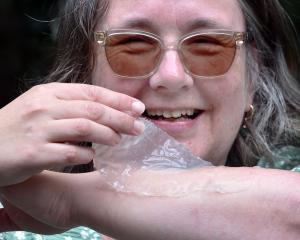Synthetic cannabis product K2 remains for sale in Dunedin, despite a temporary ban on one of its ingredients, which took effect yesterday.
There was no way retailers and consumers of K2 could know whether what they sold or bought contained the banned substance, those in the industry told the Otago Daily Times.
A Dunedin retailer, who refused to give her name, said she had to trust that manufacturers of the product had stopped using the banned ingredient known as EAM-2201.
K2 packets did not contain ingredient lists, serial or batch numbers, bar codes or any other information about when, and with what, the product was made.
The retailer said she had sold out of K2 when the ingredient ban was announced last week and her subsequent order from the manufacturer for new product arrived yesterday.
She said the ban had not stopped people from buying K2 and other synthetic cannabis products.
Another central Dunedin retailer spoken to by the ODT yesterday said everything sold in his shop, including K2, was legal.
The ingredient ban had not made a difference in respect of K2 being sold, he said.
The retailer, who did not want to be identified, said the ''new recipe'' for K2 had been around for ''some time'' and the product was tested by manufacturers.
One Dunedin dairy owner said they used to sell K2 in small amounts but stopped stocking the product this week because of the ban.
Another dairy manager said she had never sold K2 and was not about to start.
Sergeant Chris McLellan, of the Dunedin proactive policing team, said the ban did nothing to reduce the risk of K2 and other synthetic cannabis products.
Recorded effects included vomiting, agitation, drowsiness, psychosis, hallucinations, headache, seizures and tremors.
Sgt McLellan said ''everybody'' from police to health workers had concerns about synthetic cannabis products, especially because there was no way of knowing whether they still contained banned substances.
''Unfortunately, K2 is still for sale and there is no way of distinguishing between new and old product. The question is, why aren't the manufacturers putting on the product what it actually contains, and the answer is, they don't want to,'' he said.
Sgt McLellan said he had talked to some Dunedin retailers who were holding outdated K2.
''They are concerned there has been no recall of the product by the manufacturer, who has implied that they changed the product a month ago. But without factual or evidential proof of that the retailers don't know what they are selling, and consumers don't know what they are buying,'' he said.
The 12-month ban on EAM-2201 was prompted by reports of bad side-effects among users in Otago and Southland.
A permanent psychoactive substances regime, due to be implemented next year, would require manufacturers and distributors to prove their products were safe before they could be sold.
To date 50 substances found in 30 products had been banned.
Anyone importing, making or supplying banned substances faces up to eight years in jail.












